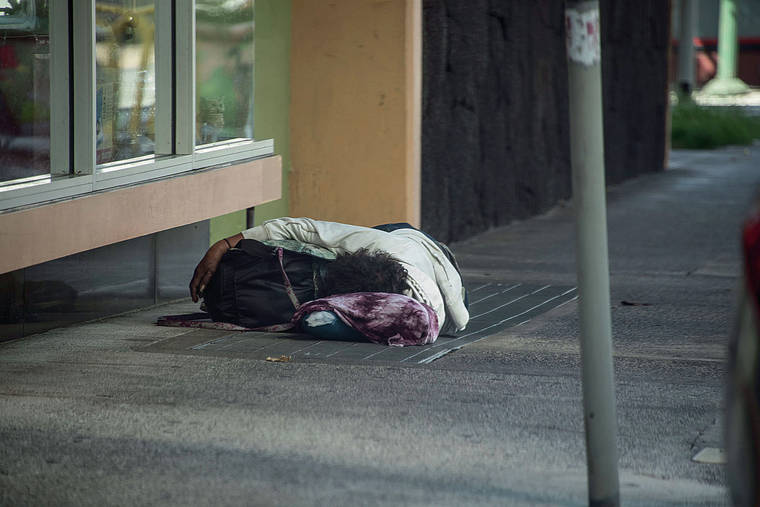There are two bills currently in the state Legislature that have the potential to improve the way our state can break the tragic cycle of homelessness caused by crippling psychosis in people with persistent mental illness.
Thousands if not millions of dollars in health care costs, ambulance calls, repeated police interventions and the endless recycling of detention in jail could be saved by having our courts mandate prompt treatment for those who direly need it but lack decisional capacity to consent to treatment.
A stroll down the streets of urban Honolulu or suburban and rural neighborhoods provides clear evidence that mental illness and homelessness go hand-in-hand. It’s easy to spot the shirtless women or pantless men walking down the middle of the road. On a good day, they keep to themselves. On a bad day, they might scream obscenities to voices only they can hear.
There is a saying that “if you don’t want what you’ve always had, then don’t do what you’ve always done.” Years of allowing mentally ill homeless neighbors to decompensate on the streets has resulted in more than a blight on our community. Our failure to accommodate these individuals, disabled by their disease, has robbed years of life from them. Abandoning these individuals to their “freedom” to live on the streets, while severely disabled, can be a death sentence. More than 100 homeless residents are dying on our streets each year, at an average age of only 53-54, nearly 30 years earlier than the rest of the population.
At The Institute for Human Services (IHS), I see every day what’s possible when people receive the help they need. But individuals suffering from serious mental illness often refuse help. What do we do? We offer them help in the form of emergency evaluation and psychiatric treatment at the hospital, medical care, shelter, hygiene services and case management.
But their mental illness often causes them to refuse all treatment and help because they don’t believe they are mentally ill. Sadly, our hands are tied if they refuse help. The system is stuck, as we are, doing what we always do and getting what we’ve always gotten.
House Bill 310, House Draft 2 is moving forward with a mandate for these individuals to be evaluated in an emergency situation for whether they need a surrogate decision-maker or guardian. This is a good first step toward halting the revolving door of repeated emergency room visits.
Unfortunately, a section of the bill was deleted that would have allowed a 30-day window of emergency treatment to stabilize a person deemed by medical professionals as lacking decisional capability. This section of the bill drew opposition from those who do not want to authorize treatment over objection, even if the “objection” is a manifestation of the individual’s mental illness. Alas, our mental health system is still in need of an expeditious way to help this disabled population when their mental illness causes them to resist all efforts to help.
The second bill will be heard on Monday. House Bill 345 was designed to streamline the legal process to get treatment for these individuals by court order. It modifies the existing Assisted Community Treatment statute by automatically appointing a guardian ad litem (GAL) to each case to represent the individual’s best interests. This step typically requires months to complete, dragging out the suffering for those awaiting needed help.
An additional improvement in the bill would be to remove the Public Defender from these cases, with the understanding that the GAL is the client’s best advocate and additional players serve only to further delay the process. Please submit your testimony in support of HB 345, HD2 today.
Connie Mitchell is executive director of The Institute for Human Services.

